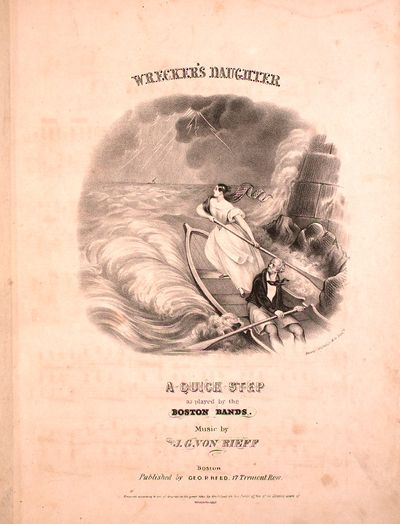Annotation:Wrecker's Daughter (1): Difference between revisions
No edit summary |
No edit summary |
||
| Line 12: | Line 12: | ||
'''WRECKER'S DAUGHTER.''' American (?), Quickstep (2/4 time). D Major. Standard tuning (fiddle). AABBCC. The melody was originally German, composed by J.G Von Rieff (1771-1842). | '''WRECKER'S DAUGHTER.''' American (?), Quickstep (2/4 time). D Major. Standard tuning (fiddle). AABBCC. The melody was originally German, composed by J.G Von Rieff (1771-1842). | ||
[[File:wreckers.jpg|400px|thumb|right|]] | [[File:wreckers.jpg|400px|thumb|right|]] | ||
The piece commemorates Grace Darling | The piece commemorates a 23 year woman, Grace Darling [https://en.wikipedia.org/wiki/Grace_Darling], who rescued nine people from the wreck of SS Forfarshire, which sank near the Farne Islands off the coast of Northumberland in 1831. It was was the inspiration for musical pieces, prose works and stage plays, as well as songs, and was popular with mid-19th century brass bands. Sheridan Knowles wrote a play called '''The Wreckers's Daughter''', staged at Drury Lane in 1836. | ||
<br> | <br> | ||
</div> | </div> | ||
Revision as of 17:20, 9 August 2017
X:1 T:Wrecker's Daughter [1] M:2/4 L:1/8 R:Quick-Step B:Oliver Ditson – The Boston Collection of Instrumental Music (c. 1850, p. 100) Z:AK/Fiddler’s Companion K:D A/A/A/z/ A/A/A/z/|FA d2|dcBA|B/B/B/z/ B/B/B/z/|Bd g2| gfed|c/c/c/z/ c/c/c/z/|c/c/c/z/ c/c/c/z/|Ac/e/ a2|Ac/e/ a2| fedf|edce|d/d/d/z/ d/d/d/z/|d2 z2::eefe|ccdc| BBf>e|c>^G A/B/c/d/|eefe| ccdc|BBfe|A z a2:| |:(F2 A)d|(F2 A)d|(G2 B)d|(F2 A)d|(E2G)B|(A2 d)f| e^g/g/ gg|az a2|(F2 A)d|(F2 A)d|(G2B)d| (F2 A)d|(E2G)B|(A2d)f|eA/A/ Bc|d3 z!D.C.!:|]
WRECKER'S DAUGHTER. American (?), Quickstep (2/4 time). D Major. Standard tuning (fiddle). AABBCC. The melody was originally German, composed by J.G Von Rieff (1771-1842).

The piece commemorates a 23 year woman, Grace Darling [1], who rescued nine people from the wreck of SS Forfarshire, which sank near the Farne Islands off the coast of Northumberland in 1831. It was was the inspiration for musical pieces, prose works and stage plays, as well as songs, and was popular with mid-19th century brass bands. Sheridan Knowles wrote a play called The Wreckers's Daughter, staged at Drury Lane in 1836.
